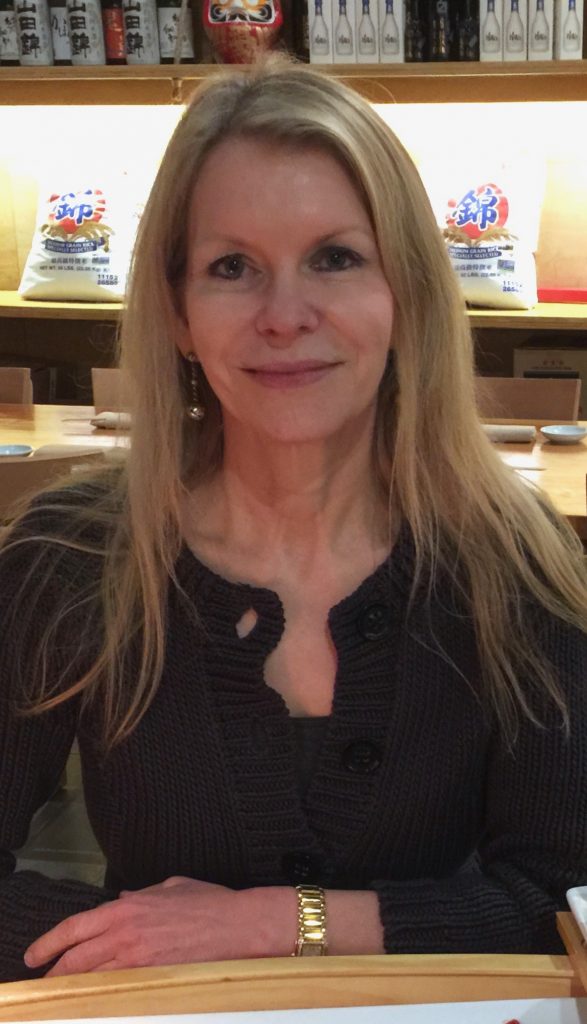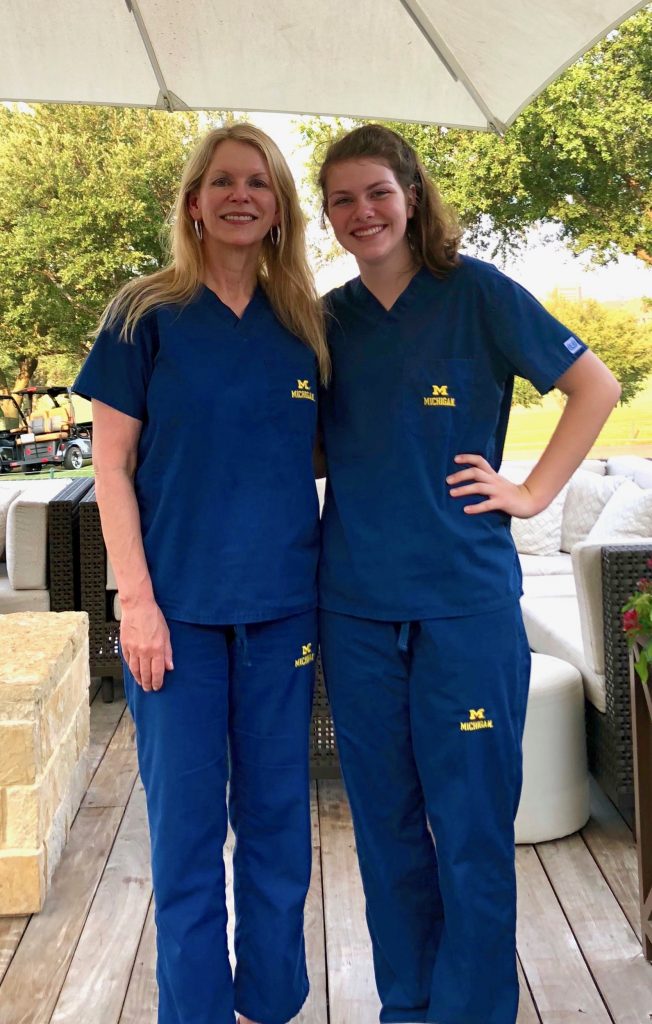Donor Profile: Dr. Denise Turunen – An Upper Peninsula native gives back with a scholarship for UP students12 min read
This profile is one in a series highlighting School of Dentistry alumni, donors and students.
Dr. Denise Turunen is a periodontist who practices and lives in one of the largest and most diverse urban areas in the United States. She opened her practice in 1993 in Irving, Texas, which is part of the Dallas – Fort Worth metroplex that today is home to about 7 million people. Several years ago, the zip code where her practice is located was identified as the most ethnically and racially diverse neighborhood in the country.
Dr. Turunen’s professional success in such a metropolitan area is a remarkable contrast to the place where she started on the path to dentistry. She grew up in the unincorporated hamlet of Pelkie at the foot of the Keweenaw Peninsula in the northwest part of Michigan’s Upper Peninsula. It’s a sparsely populated area settled by immigrants from many European and Scandinavian countries who came to work in the Copper Country mines in the late 19th and early 20th centuries. When the mines closed, those who stayed transitioned to logging and farming.

As one of nine siblings in a Finnish farm family, Turunen loved the rural life and excelled in school, becoming the valedictorian of her high school class in the nearby town of Baraga. Following the lead of a cousin who had graduated from the University of Michigan School of Dentistry, she earned three degrees from the dental school before settling in Texas.
Turunen and several of her siblings chose professional careers that took them far from Pelkie, but their parents and several family members remain in the area. She returns there a couple of times a year to see family and during one recent visit she led a continuing education program attended by dental professionals from across that area.
It’s a heritage that is important to Turunen as she looks back on her dental education and career from the vantage point of 27 years of successful private practice. Late last year, she made a $20,000 commitment to the School of Dentistry for need-based scholarships that will be available to aspiring dental students from the three counties in the Keweenaw Peninsula – Baraga (where Pelkie is located), Houghton and Keweenaw.
“I knew there was something I wanted to do for my community, but I wasn’t quite sure how I wanted to contribute to that part of the Upper Peninsula,” she said. “I’ve also been wanting to support the dental school, so I decided that this scholarship does both.”
Perhaps students who benefit from the scholarship fund will return to practice in the UP, but Turunen said that is not a condition. Like her journey from Pelkie to Ann Arbor to Dallas, “You never know where their lives are going to take them,” she said. “They have to follow their own path. But hopefully, even if they don’t go back to practice there, they can in some way promote excellent dental health, making sure that area has excellent dentists.”
•
Turunen traces her interest in dentistry to wearing braces as a teenager and to the testimonials of her cousin Gary Moberg, who earned his DDS at U-M in 1976. He impressed her with his enthusiasm for both dentistry and U-M, which he explained had the best dental school in the world. Turunen headed in that direction by enrolling at Michigan State University with a focus on the science she would need to enter dental school. But another, very pragmatic factor changed her course for the time being.
The year she started at MSU, her parents were supporting four daughters in college. Their substantial financial obligation made her determined to find a career path where she could immediately earn an income. “At the end of four years of undergrad, I wanted to have a degree that was marketable,” she said. “I wanted to be self-sufficient. It was really important to me.” While visiting a sister who was attending U-M, Turunen met a dental hygiene student who spoke highly of the dental school’s hygiene program. It seemed like a good solution. “If I transferred, I could finish in four years and then earn some money. I thought, who knows what I’ll do with my life, but I really wanted to take some of the financial burden off my parents.” She met the transfer requirements, embraced the hygiene coursework and graduated on time. In short, she said, “I loved it.”
As she approached the hygiene program graduation, a dental school advisor noted that her excellent grades made her a prime candidate to continue on for a DDS. He advised her to work for a couple of years as a hygienist to be sure that dentistry was what she wanted, which is exactly how it turned out. She worked as a hygienist in Traverse City for a year, then for a year near Pelkie, then returned to Ann Arbor to start dental school.
Turunen’s work ethic continued throughout the four years she was earning her DDS. Capitalizing on her experience as a hygienist, she spent one or two nights a week and some Saturdays working at dental offices in Milan and Ann Arbor. The benefit went beyond earning money to help with tuition. She gained valuable hands-on experience, often identifying conditions in her patients after it had been recently described in a classroom lecture. The dentists in the office were generous in sharing information about unusual or particularly interesting cases. “There were times when I felt that I could have used that time to study, but overall there were so many more advantages that I had by working during dental school,” she said. “The other side of it, though, was that I had to learn to really pay attention in lectures because I knew there was a good chance I might not have the time to read these notes ever again. Some people do better with book learning, but I learn well in presentations and lectures.”
Even during spring breaks and holiday breaks in the dental school schedule, she found time to expand her knowledge and experience. She was thinking about pursuing oral surgery as a specialty. Faculty member Dr. James Hayward, a world-class oral surgeon, was semi-retired and working part-time in Marquette, Mich., with Dr. Pete Mestnik (DDS 1977, MS 1980). Marquette was on the way to Pelkie so she would stop to observe their work. “They were so gracious,” Turunen recalls. “I would go up there on spring break and Christmas break, go to the hospital with them, scrub in and observe their orthognathic surgeries. Dr. Hayward would always quiz me on anatomy. It was like a mini-residency. All that one-on-one attention with a wonderful surgeon like James Hayward. Who gets that in dental school? Nobody.” Yet Turunen did, thanks to her initiative and the generosity of a faculty member and alumnus.
It was a different faculty member, however, who steered Turunen to a different specialty as a career. One day she was sitting in a lecture given by Dr. Raul Caffesse, chair of the Department of Periodontics, as he talked about muco-gingival procedures. She was immediately fascinated as he described various conditions and treatments. “And I thought, this is exactly what I want to do.”

After graduating with her DDS in 1986, she stayed at the dental school for the next three years, completing her master’s degree in periodontics in 1989, with Caffesse acting as her chief mentor. She taught at the school and, as she had during her DDS years, worked two evenings and Saturdays, practicing general dentistry with adjunct faculty member Dr. Wayne Walcott (DDS 1975, MS Restorative 1982). Once again, mixing academia with private practice allowed her to make money and advance her professional skill at the same time. Teaching at the dental school was equally beneficial in terms of seeing more patients, treating more conditions and generally preparing herself for eventual private practice.
As Turunen approached completion of her master’s degree, Caffesse moved to Texas to take a periodontics leadership position at University of Texas Health Science Center in Houston. He learned of an open teaching position at the Baylor College of Dentistry in Dallas, now Texas A&M College of Dentistry, and recommended that she consider it as a first career step. She applied, was hired as an assistant professor and taught there for four years. In 1993, she started her private practice in Irving part-time, still teaching part-time at the Baylor dental school for two more years. In 1995, she made the break to private practice full-time and has been in the same busy suburban Dallas office for the last 27 years. The scope of her practice includes surgical and non-surgical treatment of periodontal diseases, cosmetic periodontal procedures, the placement of dental implants and the treatment of gingival recession. She has been a Diplomate of the American Board of Periodontology since 1992.
As she looks back on her time at the dental school, she remembers it as challenging, rewarding and non-stop learning. She says she loved almost all of the coursework and clinical requirements. Oddly, however, she says the one class she liked the least is probably the most important class she ever took in terms of preparing for private practice. She and her classmates dreaded the Oral Diagnosis Clinic, which involved learning how to take a patient’s medical and dental history. Students were drilled over and over about “the Michigan way” of very deliberately questioning patients who may have indicated absolutely no medical problems on their initial patient survey, sometimes because they forgot or maybe because they assumed something minor was not a problem.
“Especially when a patient checks everything as being negative, we were told – it was ingrained in us – you still follow up. You still get them to talk. You ask some follow-up questions. We had to fill out all these forms and we really wanted to be doing something more constructive,” Turunen said. “But looking back, if I had to say what has been the most beneficial to me as a successful dentist, it is that. It has helped me so much in making the diagnoses and connecting the dots and getting information out of patients. That could easily have been glossed over in dental school.”
A classic example occurred a few years ago at her Irving practice. An athletic man in his 50s was referred for a crown lengthening and was in a hurry to have the procedure scheduled. He didn’t indicate any problems on his health history questionnaire. Employing the “Michigan way” that she learned long ago, Turunen asked additional questions about allergies and allergic reactions to drugs. The man then volunteered that he sometimes had “a little bit of blood” in his urine after taking Ibuprofen. How often, she asked. Occasionally after he takes the drug to ease sore muscles from running. How long had he noticed this? A year, he said. Turunen immediately made a deal with the patient: If he would contact his physician that very day and go in for a medical exam about the blood in the urine, then she would schedule his crown lengthening appointment. She later learned that the man was diagnosed with renal cancer and one of his kidneys was removed.
She tells that story in explaining the many reasons she values the time she spent at the U-M School of Dentistry. “It reinforced the value of the thing I liked the least in dental school,” she says. At the time, she and other students sometimes rolled their eyes or complained about the painstaking methodology and procedures they were required to complete. And yet, today, after many years of private practice, she knows she indeed received the world-class education that her cousin raved about when she was considering careers.
It’s why she has given the financial gift to help students from the Keweenaw Peninsula gain access to a first-rate dental education in their home state. The gift made sense for her, she said, because “I can’t imagine my life if I hadn’t gone to the Michigan dental school. I am very, very grateful.”

###
The University of Michigan School of Dentistry is one of the nation’s leading dental schools engaged in oral health care education, research, patient care and community service. General dental care clinics and specialty clinics providing advanced treatment enable the school to offer dental services and programs to patients throughout Michigan. Classroom and clinic instruction prepare future dentists, dental specialists and dental hygienists for practice in private offices, hospitals, academia and public agencies. Research seeks to discover and apply new knowledge that can help patients worldwide. For more information about the School of Dentistry, visit us on the Web at: www.dent.umich.edu. Contact: Lynn Monson, associate director of communications, at [email protected], or (734) 615-1971.

